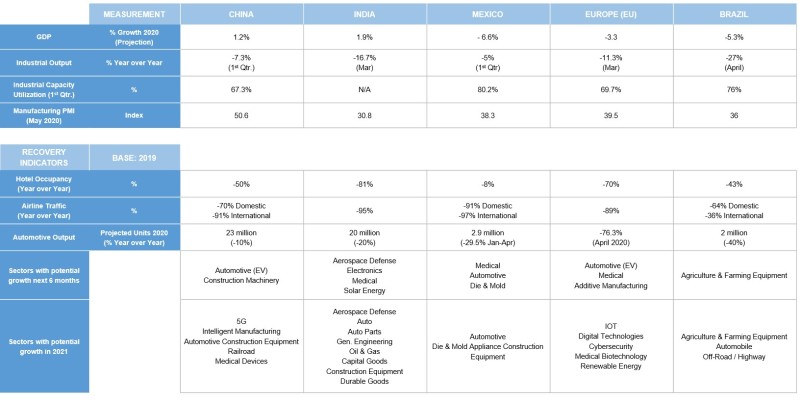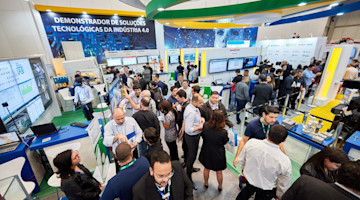Actionable global business intelligence is vital to our members during these uncertain times. AMT’s Global Tech Centers will supply updated information from their regions regarding new opportunities as well as status reports on local manufacturing facilities that utilize your products and other relevant news. This is the second installment in a series.


Mexico
For more information, contact Carlos Mortera (cmortera@AMTonline.org).
The Mexican appliance industry was deemed an “essential” industrial sector, allowing important OEMs located in the country (LG, Samsung, Mabe, Electrolux, Whirlpool, Rheem, Carrier) to continue manufacturing while observing additional precautions related to COVID-19.
Leoni Edomex opened their new plant in Chihuahua, an investment of $27 million. Located in the Cuauhtémoc Industrial Park, the facility will manufacture high-voltage charging cables for electric and hybrid vehicles such as Tesla, GM, and Ford.
Conversion is underway at the new Ford Cuautitlan facility even during the COVID-19 sanitary emergency. The plant is being updated to manufacture EVs near Mexico City.
Fiat secured a 6.9 billion euro ($7.8 billion) loan from Intensa. It reopened its two facilities in the central Mexican city of Toluca on May 27 with a gradual restart. In the northern city of Saltillo, it reopened its plant with 40% of its personnel on May 25. All three plants had been idle since March.
The automotive industry in Queretaro will start operating with a capacity of 50-70%, while aerospace will restart with an average of 30%.
K TECH Mexico inaugurated a plant in Guanajuato Puerto. The automotive supplier of injection molding and mold manufacturing and production invested $20 million in this new plant, which will create 120 direct jobs.
The Mexican government published an executive order outlining strategies and guidelines to resume economic activities in a safe, responsible, and staggered manner. The order provides direction to essential and non-essential companies on reopening their plants, considering their specific activities, risks, and workforce size. It also dictates the restrictions and safety measures conditioning the reopening. Read more here.
South and Central America
For more information, contact Carlos Mortera (cmortera@AMTonline.org).
Volkswagen’s Argentina plant, located in Córdoba, and Scania’s plant in Tucumán resumed their operations.
ResilientBreath, a ventilator designed in Silicon Valley specifically to provide support during the pandemic, will be manufactured in Medellin, Colombia by a new company launched by Haceb (a refrigerator manufacturer) and SOFASA (a Renault facility).
Two additional countries recently joined OECD: Colombia and Costa Rica. Their inclusion is a testament to the strengthening of their economies. Colombia, in its seventh year of an FTA with the United States, is one of the few Latin American countries with a positive GDP (3.7% for Q1 2020 YOY). Costa Rica, with a population of 5 million people, is recognized as a free market environment focused on precision manufacturing for medical devices, and the opportunities will most likely expand with their incorporation into OECD.
Colombia is getting back to normal. Over 80% of its manufacturing and construction companies have resumed their production.
Renault gains power over Nissan in South America; of the five plants of the alliance, only two will continue production.
In Colombia, from January to April, the foreign direct investment was $3.533 million higher than the previous year.
In Argentina, 90% of the territory has reported COVID-19 cases, and the country is now in various stages of reopening the economy. The metropolitan area of Buenos Aires is tightening controls to stop the spread of the virus.
Brazil
For more information, contact Achilles Arbex (aarbex@AMTonline.org).
Brazil, sadly, is the new epicenter of the global coronavirus pandemic.
The United States has banned all travel into the country from Brazil. Indirect travel from Brazil to the United States requires a 15-day quarantine prior to arrival. Trade and cargo have continued without interruptions or restrictions.
The country will continue with their partial lockdown through June 15. The government of the state of São Paulo is considering a total lockdown for that state.
The federal government has created a political and administrative impasse regarding management of the COVID-19 crisis due to the president wanting to open the economy despite the public health cost.
Nearly half (43%) of the small- and medium-sized companies in Brazil bought software providing remote work tools, expecting home offices to become a new reality.
The Brazilian Development Bank is planning to bail out EMBRAER by providing the Brazilian aircraft manufacturer with a package that may reach $1.1 billion.
Volkswagen has resumed production at its facility in São José dos Pinhais, Paraná. This plant is the company’s first in the country to return to operation; the other factories – located in the São Paulo cities of São Bernardo do Campo, Taubaté, and São Carlos – are in the process of reopening.
With the Real hitting an exchange rate close to R$4.90 to the U.S. dollar, prices of imported products and components have increased by almost 50% from a year ago. As a result, even Brazilian-manufactured or assembled products that are very dependent on certain imported materials and components have become cost prohibitive. In addition, with the pandemic affecting international trade and the dynamics of the supply chain, Brazil is replacing imported products with locally manufactured ones in a process of importation replacement. For example, the following companies are investing in an accelerated import-substitution program:
CNH – Agricultural machinery, including harvesting machines, tractors, implements, etc.
AGCO – Off-road equipment and tractors.
VW – Plans to locally produce engine components and airbags which it currently imports.
ZF Transmissions – Will expand and diversify its currently restricted supply chain for quality components of its transmissions and shafts in Brazil.
Bosch – Automotive braking systems, motors, ignition, etc.
ROMI has started a rent and lease program for machines in Brazil. They are calling the new program “ROMI MAAS” (Machines as a Service).
China
For more information, contact Fred Qian (fredqian@AMTchina.org).
The pandemic situation in China has, so far, been contained successfully. There are minimal new cases and deaths.
The travel ban in China has ended; however, wearing a mask is still strongly recommended or required in public places, including subways, airports, high-speed trains, shopping centers, and restaurants.
Production and businesses are back to normal, operating at almost 100%. The need to wear a mask depends on site conditions and the density of people. It is not always a mandatory measure.
People may now travel freely, and there is no need to be quarantined for 14 days before or after the trip (STC engineers have been traveling for two weeks now for site services in Shiyan City, Hubei Province).
The Tesla (Shanghai) facility was completely built in 10 months after construction began on Jan. 7, 2019; the company launched the first Model 3 in Shanghai on Oct. 24, 2019. However, Tesla’s overseas supply chains have recently encountered some difficulties due to COVID-19, including Panasonic batteries and some key part assemblies from Tesla’s facility in Nevada, USA. In response, Tesla (Shanghai) is under expansion to double its area to increase component production (localization) for the Model 3 and will begin producing the Model Y soon. Planned production capacity for Model 3 will reach 4,000 units per week in the middle of 2020, equal to the annual output of 200,000 units at Tesla (Shanghai).
HUAWEI Technology is working with 18 Chinese automotive manufacturers to establish the “5G Automobile Ecosystem,” including FAW, DFMC, SAIC, GAC, BAIC, BYD, GREATWAL, CHERRY, and JAC. This ecosystem will provide support for “self-driving” vehicles as 5G addresses some of the tough technological issues involved in meeting the requirements for self-driving cars. According to a research report from McKinsey & Company, China will become the largest self-driving car market in the world, and McKinsey estimates that new car sales and relevant services values will surpass $500 billion in 2030.
The China Association of Automobile Manufacturers (CAAM) in early May reported that monthly output reached 2.1 million units in April 2020, while monthly sales were at 2.07 million units, showing respective increases of 2.3% and 4.4%. The production and sales figures mark the end of the continuous declines over the last 21 months and represents a V-shaped incline for the month.
China is preparing its next five-year plan (“the 14th Five-Year-Plan”) covering 2021 to 2025. The five-year plan is a national-level plan for the economy and social development. CMTBA is working with several other China manufacturing associations to draft the manufacturing part of the plan with a focus on the following:
IoT, AI, Mega Data.
New infrastructure.
Transformation to smart manufacturing and digital manufacturing.
2021 and 2022 will be a good time for AMT members to develop new customers for new projects.
Five automobile trade shows were confirmed to take place after the containment of COVID-19:
Chongqing International Auto Exhibition, June 13-21, 2020 in Chongqing (yearly event).
Guangdong-Hong Kong-Macau Greater Bay Area International Auto Show, June 20-28, 2020 in Shenzhen, Guangdong Province (yearly event).
Chengdu Motor Show 2020, July 24-Aug. 2, 2020 in Chengdu, Sichuan Province (yearly event).
Auto China 2020, Sept. 26-Oct. 5, 2020 in Beijing (even years in Beijing, odd years in Shanghai).
Auto Guangzhou, Nov. 20-29, 2020 in Guangzhou (yearly event).
Volkswagen Group announced on May 29 that it invested 1 billion euros ($1.13 billion) to buy 50% of the shares of the Chinese automobile manufacturer Jianghuai Automobile Group in Anhui Province. Meanwhile, VW will increase investment in its joint venture company – Jianghuai Volkswagen EV Company – to control 75% of its shares. The JV will reach an annual EV output of 350-400,000 units by 2029. Total investment of the project will be 1 billion euros ($1.13 billion).
The Chinese government announced on June 1 a plan to build a high-level free-trade port on the southern island province of Hainan. Hainan island is approximately the size of Taiwan and the population of Hong Kong. The master plan for the free-trade port calls for the first stage to take place by 2025 and a more advanced stage by 2035. Authorities expect to make Hainan into the country’s largest special economic zone and the frontline of China's integration into the global economic system. Major infrastructure projects will place a high demand on construction equipment manufacturing.
Europe
For more information, contact Huber Sawicki (HSawicki@AMTonline.org).
The MT trade shows monitored by AMT Europe and scheduled to take place after mid-September seem to be on track, and at this point, there is no indication that they will be further postponed or canceled.
Poland could gain up to $8.3 billion each year as global value chains shift away from China amid the coronavirus pandemic according to a new report by the Polish Economic Institute (PIE), a public think tank.
Global merchandise trade will drop by 13-32% in 2020 according to predictions by the World Trade Organization (WTO). As a result, trade may become more regionalized and protectionism may increase, leading to a diminished role for China in global value chains, argues PIE. Poland could be amongst the biggest European winners in this shift, assuming a best-case scenario of increased domestic production of intermediate products as well as a larger role for eastern EU member states in producing goods for the entire bloc, finds the report.
Western and Central European countries are gradually lifting travel and social interaction restrictions, transitioning from phase 3 to phase 4 (final) of the return to normalcy. Border crossings are being increasingly relaxed, and the expectation is that it will soon be allowed for Germany, Switzerland, Austria, Slovenia, Czech Republic, Slovakia, Hungary, and Poland by next month. Poland may also join Lithuania, Latvia, and Estonia, where the ban has already been lifted.
Airbus and Koniku Inc. have made a significant step forward in the co-development of a solution for aircraft and airport security operations by extending research activities to include biological hazard detection capabilities as well as chemical and explosive threats.
The automotive sector in Europe is one of the pillars of economic and social welfare with 310 vehicle assembly and production plants and sales of over 430 billion euros ($480 billion) every year. The EU is working on proposals to overcome the massive fallout from the pandemic for the industry of 14 million workers as the industry continues to struggle. An additional challenge it faces is making the transition to carbon-neutral.
Renault will close several factories, making 15,000 people redundant.
Nissan will close its Barcelona factory, with 20,000 redundancies, but will keep its plant in the U.K. open.
In March, Hyundai began deliveries of electric Kona vehicles from its plant in Czechia at the rate of 3,000 per month, which is close to the planned annual capacity.
The European Commission is proposing to create a new recovery instrument, Next Generation EU, embedded within a revamped long-term EU budget. To protect lives and livelihoods and build a lasting and prosperous recovery, the European Commission is proposing to harness the full potential of the EU budget. Next Generation EU will add 750 billion euros ($846 billion) as well as targeted reinforcements to the long-term EU budget for 2021-2027. This will bring the total financial firepower of the EU budget to 1.85 trillion euros ($2.09 trillion).
India
For more information, contact Arun Mahajan (AMahajan@AMTonline.org).
Travel restrictions were lifted at the beginning of June, but social distancing still applies.
Manufacturing and other businesses will be resuming their activities but on a limited basis and following rules established by local, provincial, and national authorities.
Likely impact of COVID-19 in India by industrial sector:
Low impact: Pharma and healthcare, telecom, FMCG, defense and aerospace, electronics, solar energy.
Medium impact: Specialty chemicals, real estate and construction, bank and insurance, shipping, textiles, utilities.
Severe impact: Oil and gas, auto and auto components, tourism and civil aviation, capital goods, general engineering, consumer durables.
The Indian government changed their “general financing rule” for procurement of equipment and services by state-owned companies through the tendering process. For goods and services valued below $27 million, preference would be given to companies supplying equipment and services from within the country. The idea is to provide incentives to India-based companies to work toward enhancing their technology acumen by acquiring technology from abroad or forming JVs with foreign companies to manufacture and supply equipment locally.
$7 billion of incentives were announced for boosting electronics and hardware manufacturing in India. The incentives would be offered under three schemes:
Production-Linked Incentive (PLI): The scheme would offer an incentive of 4-6% over the next five-year period on incremental sales of goods manufactured in India. This would cover large-scale manufacturing of mobile phones, specified electronics components like PCB, semiconductor devices, sensors, transducers, micro and nano electronic components, and various assembly, marking and packaging (ATMP) units.
Scheme for Promotion of Manufacturing of Electronic Components (SPECS): For strengthening the manufacturing ecosystem for electronic components and semiconductors. An incentive of 25% will be offered for over an eight-year period on capital expenditures pertaining to plant, machinery, equipment, associated utilities, and technology.
Electronics Manufacturing Cluster (EMC-2.0): For creating quality infrastructure as well as common facilities and amenities for electronic manufacturers. An incentive of up to 50% of project costs will be awarded, subject to a ceiling of $10 million for every acre of land. The tenure for the scheme is eight years.
Written by the AMT Global Services Team.
Curating assistance by Mario Winterstein




